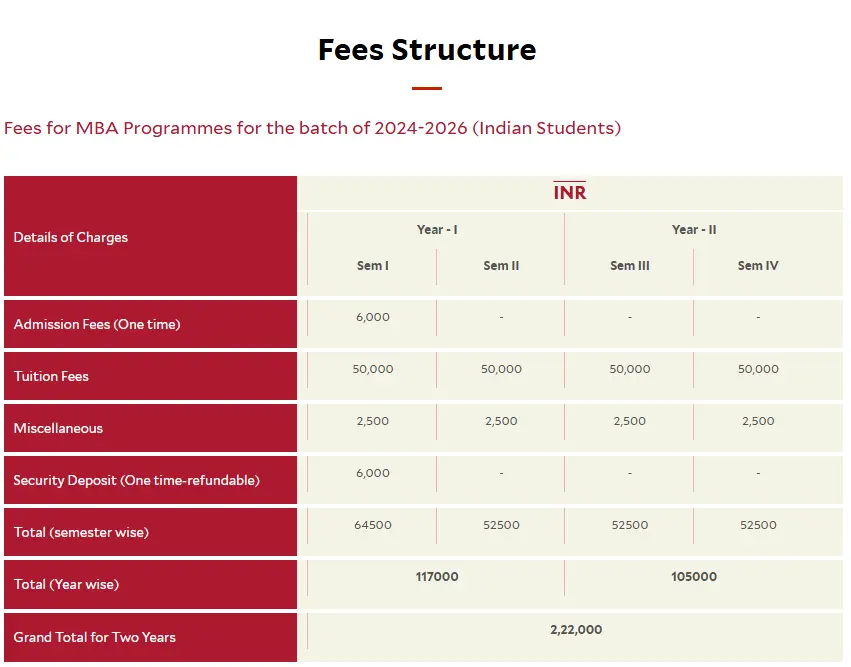Nalanda University, an epitome of educational heritage and scholarly excellence, now flourishing in its new campus in Rajgir, Bihar. Reviving the grandeur of one of the world’s oldest universities, Nalanda University stands as a beacon of knowledge, innovation, and sustainability. As it reopens its doors with a contemporary vision rooted in its historic legacy, prospective students have a unique chance to be part of this iconic institution. Dive into this comprehensive guide to explore the diverse courses offered, the streamlined admission process, eligibility criteria, and the transparent fee structure at Nalanda University. Discover how you can embark on an academic journey that blends ancient wisdom with modern intellect at a university that continues to shape global leaders and thinkers.
Nalanda University Admissions: School of Studies
The University is currently mandated to offer a total of seven Schools.
• School of Ecology and Environment Studies
• School of Historical Studies
• School of Buddhist Studies, Philosophy and Comparative Religions
• School of Languages & Literature/ Humanities
• School of International Relations and Peace Studies
• Business Management in relation to Public Policy and Development Studies
• Any other School as prescribed by the Statues
Nalanda University Courses
Nalanda University offers a diverse array of postgraduate, doctoral, diploma, and certificate courses across multiple disciplines:
Master’s Programs:
- MA in Buddhist Studies, Philosophy & Comparative Religions
- MA in Hindu Studies (Sanatana)
- MA in Historical Studies
- MA in World Literature
- MSc in Ecology and Environment Studies
- MBA in Sustainable Development & Management
PhD Programs:
- PhD in Buddhist Studies, Philosophy and Comparative Religions
- PhD in Ecology and Environment Studies
- PhD in Historical Studies
Diploma and Certificate Courses:
- Diploma and certificate courses in Sanskrit, English, Korean, Yoga, Pali, and Tibetan
Also Read: These Four Factors Directly Affect The Heart
International Collaborations
The various Schools at Nalanda University have established collaborative research links with institutions around the world.
• Nalanda-Sriwijaya Centre, Institute of Southeast Asian Studies (Singapore)
• Peking University (China) • Bihar Heritage Development Society (India)
• Max Weber Centre for Advanced Cultural and Social Studies, University of Erfurt (Germoney)
• Borlaug Institute of South Asia (India)
• Deakin University (Australia)
• Universitas Sebelas Maret (Indonesia)
• Kanazawa University (Japan)
• Academy of Korean Studies (South Korea)
• CSIR – National Environmental Engineering Research Institute (India)
Eligibility Criteria
- For Master’s Programs: Candidates must have completed their Class 12 education with a minimum aggregate of 55% in any stream from a recognized university.
- For PhD Programs: Candidates must have secured at least 65% aggregate in a relevant stream.
- For the Post Graduate Diploma programs at Nalanda University, the eligibility criteria are as follows:
Academic Qualifications:
- A minimum of three years Bachelor’s degree (10+2+3) in the relevant language or any subject.
- Applicants must demonstrate evidence of linguistic proficiency equivalent to that of a Bachelor’s degree.
English Language Proficiency:
- All applicants, regardless of their country of origin, are required to demonstrate competence in the English language.
For International Students
For international students seeking admission to Nalanda University, here are the specific requirements:
Academic Qualifications:
- A Bachelor’s Degree with a minimum of 15 years of prior studies.
- GPA of at least 2.2 or above on a 4-point scale, or equivalent grade if another grading scale is used.
English Language Proficiency:
- Applicants who are citizens of countries other than India must present scores from any one of the following English language proficiency tests:
- TOEFL (Test of English as a Foreign Language)
- IELTS (International English Language Testing System)
- TOEIC (Test of English for International Communication)
- PTE (Personal Test of English)
- Any other standard English test recognized internationally.
Nalanda University Fee Structure
Nalanda University’s fee structure is designed to be transparent and accessible, reflecting its commitment to providing high-quality education while ensuring affordability for students from diverse backgrounds. The fees vary across different programs, with distinct structures for master’s, doctoral, diploma, and certificate courses. Additionally, the university offers scholarships and financial aid to support deserving students. The detailed fee structure is available on the university’s official website, where prospective students can find comprehensive information on tuition fees, hostel charges, and other associated costs. This ensures that applicants can make informed decisions about their educational investments at Nalanda University.
Nalanda University Fee Structure for MBA

Nalanda University Fee Structure for PhD

Nalanda University Fee Structure for Master’s Programmes

Nalanda University Fee Charges for Meal

Nalanda University website
Here is the official website of Nalanda university where you can find every detail of university.
Nalanda University Admission Process
Admission Process
Admission to Nalanda University is either merit-based or entrance exam-based, depending on the program. Here’s how prospective students can apply:
Application Procedure: Candidates must apply online through the university’s official website. The application forms are available online, and candidates are required to fill them out accurately and completely.
Selection Process:
- Master’s Programs: Selection is based on merit or entrance exams such as MAT, XAT, CAT, depending on the program.
- PhD Programs: Admission criteria include merit or specific entrance exams conducted by the respective departments.
Interview: International students are required to appear for an interview via video conferencing platforms like Skype, as per the scheduled dates provided by the university.
Conclusion
In conclusion, Nalanda University, with its seven distinct Schools of Studies, offers a comprehensive range of postgraduate, doctoral, diploma, and certificate courses designed to cultivate academic excellence and global perspectives. The university’s international collaborations and rigorous admission process ensure a diverse and highly qualified student body. Whether you aim to explore historical studies, environmental sustainability, or advanced research in Buddhist studies, Nalanda University provides an unparalleled academic environment, blending ancient wisdom with modern innovation. Join Nalanda University to become part of a prestigious legacy and prepare for a future of impactful global contributions.












